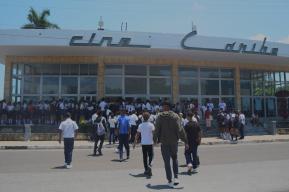
Article
A Comparative Study on Hybrid Learning now available

The COVID-19 lockdown disrupted all levels of education. Faced with the challenge of providing continuous, sustainable and relevant learning, policymakers and educators sought alternatives; in many countries, this took the shape of hybrid learning, incorporating face-to-face and remote classes. However, the initial optimism about replacing physical classes with virtual lessons diminished as complex interconnected issues emerged. The array of hybrid learning responses prompted UNESCO-IBE to initiate research into this new mode. This resulting comparative study is a step to formalise what we know and facilitate the sharing of experiences and peer-learning on how each school or country addressed hybrid learning.
The initial phase of this study gathered case studies from Argentina, Lithuania, Mozambique, Malaysia, Namibia and the Philippines reflecting UNESCO-IBE’s interregional perspective. The research aimed to examine factors influencing hybrid learning implementation during the lockdown, with a subsequent focus on developing and validating a practical Hybrid Learning Framework for Schools. The cross-case analysis was designed not to rank or compare, but to understand and connect different scenarios, contexts and strategies.
Expanding on UNESCO-IBE’s Hybrid Education, Learning and Assessment (HELA) project, this comparative study, Phase I, focuses on current hybrid learning practices and influencing factors, while Phases II and III will concentrate on using the information gathered to create and validate a Hybrid Learning Framework for Schools. Hybrid learning is not just a response to pandemics but also serves as a viable solution for other scenarios where full school attendance is difficult. Aligned with UNESCO-IBE’s overarching vision of a comprehensive, personalized, and democratized curriculum accessible to all, hybrid learning facilitates inclusive education across diverse regions, overcoming geographic and temporal limitations. The approach aims to unlock the unique potential of every learner, fostering a more flexible and versatile educational environment.










